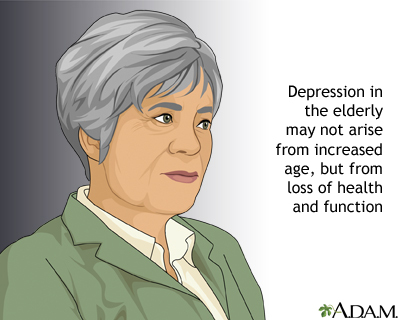Combatting Holiday Depression
Depression impacts nearly 6.7 million adults in the United States, and the stress of the holidays can make that depression worse. Many factors play into the…

Update your location to show providers, locations, and services closest to you.
Depression is a mental health condition. It is a mood disorder in which feelings of sadness, loss, anger, or frustration interfere with daily life for weeks or longer.
Depression in older adults is a widespread problem, and it is not a normal part of aging. It is often not recognized or treated.
Depression in the elderly
In older adults, life changes can increase the risk for depression or make existing depression worse. Some of these changes are:
Depression can also be related to a physical illness, such as:
Overuse of alcohol or certain medicines (such as sleep aids) can make depression worse.
Many of the usual symptoms of depression may be seen. However, depression in older adults may be hard to detect. Common symptoms such as fatigue, appetite loss, and trouble sleeping can be part of the aging process or a physical illness. As a result, symptoms of early depression may be ignored, or confused with other conditions that are common in older adults.
The health care provider will perform a physical exam. Questions will be asked about medical history and symptoms.
Blood and urine tests may be done to look for a physical illness.
A mental health specialist may be needed to help with diagnosis and treatment.
The first steps of treatment are to:
If these steps do not help, medicines to treat depression and talk therapy often help.
Doctors often prescribe lower doses of antidepressants to older people, and increase the dose more slowly than in younger adults.
To better manage depression at home:
Depression often responds to treatment. The outcome is usually better for people who have access to social services, family, and friends who can help them stay active and engaged.
The most worrisome complication of depression is suicide. Men make up most suicides among older adults. Divorced or widowed men are at the highest risk.
Families should pay close attention to older relatives who are depressed and who live alone.
Call your provider if you keep feeling sad, worthless, or hopeless, or if you cry often. Also call if you're having trouble coping with stresses in your life and want to be referred for talk therapy.
If you are caring for an aging family member and think they may have depression, contact their provider.
If you or someone you know is thinking about suicide, call or text 988 or chat 988lifeline.org. You can also call 1-800-273-8255 (1-800-273-TALK). The 988 Suicide and Crisis Lifeline provides free and confidential support 24/7, anytime day or night.
You can also call 911 or the local emergency number or go to the hospital emergency room. DO NOT delay.
If someone you know has attempted suicide, call 911 or the local emergency number right away. DO NOT leave the person alone, even after you have called for help.

Fox C, Hameed Y, Maidment I, Laidlaw K, Hilton A, Kishita N. Mental illness in older adults. In: Fillit HM, Rockwood K, Young J, eds. Brocklehurst's Textbook of Geriatric Medicine and Gerontology. 8th ed. Philadelphia, PA: Elsevier; 2017:chap 56.
National Institute on Aging website. Depression and older adults. www.nia.nih.gov/health/depression-and-older-adults. Updated July 07, 2021. Accessed September 22, 2022.
Siu AL; US Preventive Services Task Force (USPSTF), Bibbins-Domingo K, et al. Screening for depression in adults: US Preventive Services Task Force recommendation statement. JAMA. 2016;315(4):380-387. PMID: 26813211 pubmed.ncbi.nlm.nih.gov/26813211/.





Our community and patient programs provide great value to patients, families and loved ones. People can find support, educational materials, expert consultants and more. In most instances, these programs are offered free of charge.
Dedicated to improving the lives of Alachua County's senior citizens.
Dance classes designed for participants over 60 with the focus on fun, fitness and creativity.
Depression impacts nearly 6.7 million adults in the United States, and the stress of the holidays can make that depression worse. Many factors play into the…

Has a depression skeptic ever told you that it’s all in your head? Well, as a matter of fact, it is. Depression is a brain disease that takes a colorful world…
